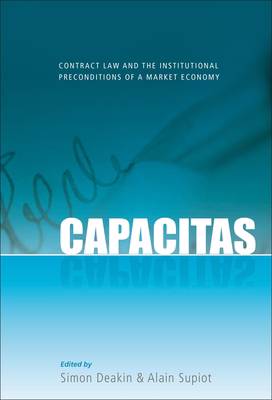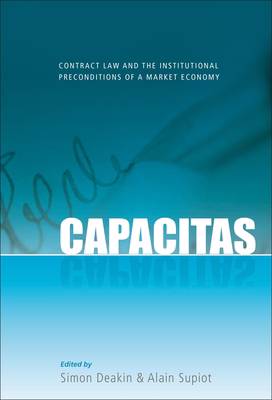
- Retrait gratuit dans votre magasin Club
- 7.000.000 titres dans notre catalogue
- Payer en toute sécurité
- Toujours un magasin près de chez vous
- Retrait gratuit dans votre magasin Club
- 7.000.0000 titres dans notre catalogue
- Payer en toute sécurité
- Toujours un magasin près de chez vous
Capacitas
Contract Law and the Institutional Preconditions of a Market Economy
Simon Deakin
Livre relié | Anglais
195,45 €
+ 390 points
Description
One of the principal tasks for legal research at the beginning of the 21st century is to reconstruct the understanding of the relationship between the legal system and the market order. After almost three decades of deregulation, driven by a belief in the self-equilibrating properties of the market, the financial crisis of 2008 has reminded everyone of the fundamental truth that markets have legal and institutional foundations, without which they cannot effectively function. The chapters in the present volume are the result of the work by a group of legal scholars which began in mid-2000, at a time when the shortcomings of deregulatory policies were becoming clear in a number of contexts. The chapters address the question of how the language of contract law describes or conceptualizes the market order and the relationship of the law to it. The perspectives taken are, in turn, historical, comparative, and context-specific. The focus of the book is on a foundational idea, the concept of capacitas, which signifies a status conferred upon citizens for the purpose of enabling them to participate in the economic life of the polity. In modern legal systems, 'capacity' is the principal juridical mechanism by which individuals and entities are empowered to enter into legally binding agreements and, more generally, to arrange their affairs using the instruments of private law. Legal capacity is thereby the gateway to involvement in the operations of a market economy. With essays on the relationship of the law and markets, this book will be of interest to scholars of contract law, economics, and regulation.
Spécifications
Parties prenantes
- Auteur(s) :
- Editeur:
Contenu
- Nombre de pages :
- 182
- Langue:
- Anglais
Caractéristiques
- EAN:
- 9781841139975
- Date de parution :
- 01-08-09
- Format:
- Livre relié
- Format numérique:
- Genaaid
- Dimensions :
- 161 mm x 242 mm
- Poids :
- 430 g

Les avis
Nous publions uniquement les avis qui respectent les conditions requises. Consultez nos conditions pour les avis.






